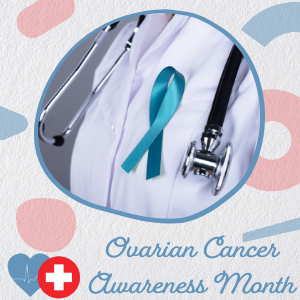Ovarian Cancer Awareness Month
 Every year, thousands of women in the United States are diagnosed with ovarian cancer. According to the American Cancer Society, an estimated 21,750 women will be diagnosed and just under 14,000 will die from ovarian cancer in 2020 alone. While positive diagnosis rates have been decreasing over the last 20 years, it is still ranked fifth in cancer deaths for women. In recognition of Ovarian Cancer Awareness Month, we want to educate those in our communities about this disease to help promote early intervention.
Every year, thousands of women in the United States are diagnosed with ovarian cancer. According to the American Cancer Society, an estimated 21,750 women will be diagnosed and just under 14,000 will die from ovarian cancer in 2020 alone. While positive diagnosis rates have been decreasing over the last 20 years, it is still ranked fifth in cancer deaths for women. In recognition of Ovarian Cancer Awareness Month, we want to educate those in our communities about this disease to help promote early intervention.
What is Ovarian Cancer?
Ovarian cancer is specific to the female reproductive system as it begins within the ovaries, where the eggs, estrogen, and progesterone are produced. Unfortunately, early-stage cancer usually comes without symptoms, allowing it to spread into the pelvis and abdomen, making it much more difficult to treat. Those who have more advanced-stage ovarian cancer may experience seemingly minor symptoms, including:
- Bloating or swelling in the abdomen
- Quickly feeling full while eating
- Weight loss
- Pelvic area discomfort
- Changes in bowel habits, like constipation
- A frequent need to urinate
There are three different types of ovarian cancer:
- Epithelial tumors: Accounting for roughly 90% of ovarian cancers, it begins within the thin layer of tissue covering the outside of the ovaries.
- Stromal tumors: Only about 7% of ovarian cancers, and begins in the ovarian tissue containing hormone-producing cells.
- Germ cell tumors: This form is rather rare and typically occurs in younger women as it begins within the egg-producing cells.
Doctors utilize several methods to properly diagnose ovarian cancer, including pelvic exams, imaging tests, blood tests, and surgery. Your doctor may use several of these methods in order to confirm the diagnosis, as well as help determine which stage the cancer is in for treatment.
Potential Causes & Risk Factors for Ovarian Cancer
There is not a clear cause of ovarian cancer, but there are some risk factors that may increase your chances of developing the disease.
- Age: While it is possible for ovarian cancer to occur at any age, it is most common in women ages 50 to 60.
- Inherited Gene Mutations: Some ovarian cancers are actually caused by gene mutations that are inherited from your parents – and also increase your risk of developing breast cancer. These genes are often referred to as “breast cancer gene 1” (BRCA1) and “breast cancer gene 2” (BRCA2). There are other gene mutations that can increase your risk, as well, such as those associated with Lynch syndrome.
- Family History: Women with two or more close relatives who have been diagnosed with ovarian cancer are at an increased risk of developing it themselves.
- Estrogen Hormone Replacement Therapy: When utilized long-term and in large doses, your risk of ovarian cancer is increased.
- Age of Menstruation Start & End: Women who started menstruation at an early age, or those who started menopause at a later age, may have an increased risk of ovarian cancer.
Be sure to discuss your potential risk factors with your doctor to determine if extra routine monitoring may be required.
Preventing Ovarian Cancer
As with many cancers, there isn’t a surefire way to prevent it developing. However, there are ways you can reduce your risk. If you aren’t already, discuss birth control pills with your physician as oral contraceptives may help reduce your risk of developing ovarian cancer. Also, be open with your physician about your potential risk factors, such as family history. You may be referred to a genetic counselor for possible testing, and if a gene mutation is found, it may be recommended to have your ovaries removed as a prevention method.
In general, women should be receiving a wellness visit yearly, and all gynecological concerns should be openly discussed. The goal of Ovarian Cancer Awareness Month is to help women understand the risks and promote early detection of this disease. If you have not had a women’s wellness exam in a while, or believe you may be at risk, visit one of our Midwest Express Clinic locations today. Our medical professionals are here to help with comprehensive exams, discreet testing, and more.




